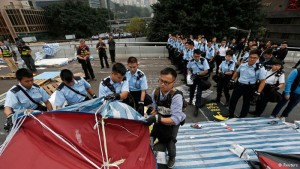
(AA) – Pro-democracy protesters continuing to camp outside Hong Kong’s government headquarters expressed sadness Wednesday as authorities cleared the last remaining tents from last year’s street demonstrations.
Staff from the Lands Department read an ultimatum in the morning warning that “illegal occupiers” could face prosecution and any items left in public areas outside the Legislative Council building could be removed, the South China Morning Post reported.
While the major encampments of the 79-day Occupy movement were cleared last December, dozens of protesters had since been gathering outside the legislature.
They had already expressed plans to vacate the area after the Beijing-backed election reform package that sparked the protests was blocked by pan-democrat lawmakers last week.
While the clearance Wednesday passed quietly, police escorted one man holding a yellow umbrella into a white van after he appeared agitated, wanting additional time to gather his items, according to local media.
Some of those at the site expressed their objections to the move to remove the tents.
Benny Mok, a 51-year-old surveyor who said he had been camping out for 270 days, told broadcaster RTHK that the clearance was “suppression without reason”.
He called the move “a PR show to make it appear we are disturbing the people”.
He added that the movement had empowered youths, who are “now becoming more involved in political issues. You would have never imagined that in the past.”
Ellen Leung, a freelance marketing worker in her 30s who said she had stayed in the camp occasionally since the protests began, said protesters had already been collecting the items before having them cleaned and donating them.
She told the Post that while she had been upset when the camps were cleared in December, she was at least comforted this time around since the government’s election plan had been blocked.
“As least we achieved something when the political reform package didn’t pass,” Leung said. “Now we’ll continue our protests in the upcoming [District Council] elections.”
If passed, the package would have allowed a body loyal to Beijing to dictate which candidates stood for chief executive — the territory’s most powerful position — in 2017 elections.
The proposals were voted against by 27 pan-democrats and one pro-establishment lawmaker.
Only eight votes were cast in favor after around 30 pro-establishment lawmakers went missing from the 70-member legislature as the vote took place, although even if they had attended the package would not have achieved the two-thirds majority required.
The lawmakers had walked out in the hope of buying time for rural strongman Lau Wong-fat to arrive, but their attempt failed as more than half of the lawmakers remained.
Hong Kong, a former British colony, returned to Chinese rule in 1997 under a “one country, two systems” formula that promised a high degree of autonomy from Beijing, including universal suffrage.
The 2014 protests, which involved more than 100,000 people at their peak, were seen as one of the most serious challenges to China’s authority since the 1989 Tiananmen Square protests that ended with a bloody crackdown in Beijing.